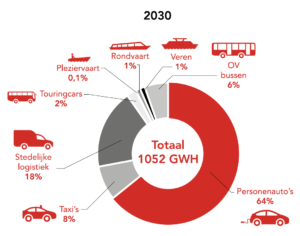In 2030, 82,000 charging points are needed in Amsterdam (NL), almost 10 times as many as today. The municipality must make this leap of scale in order to realize the ambition of an emission-free city. Amsterdam presented their ‘Laad me – Strategic plan Charging Infrastructure 2020-2030‘. The plan explains how safe, reliable, accessible and affordable charging infrastructure can be developed in Amsterdam and in cooperation with the region in the coming years.
From 8,000 to 80,000 charging points
Amsterdam wants all modes of transport in the city to drive and sail emission-free in 2030. A large part of this will be electric and companies, private individuals and the municipality (also in the greater Amsterdam region) must take major steps to ensure that these means of transport can be recharged. The plan also pays attention to city logistics.
Deployment and energy strategy
The plan presents the roll-out strategy and an energy strategy with which the electricity network will continue to suffice in the future. The rollout strategy has five starting points:
- Loading is done as much as possible on private and semi-public land.
- Where necessary, Amsterdam will install public charging infrastructure throughout the district.
- Public charging infrastructure will be placed strategically and data-driven.
- At strategic locations in the city they facilitate the realization of fast charging points.
- Collaborating on a covering network of hydrogen stations.
Regional cooperation
Amsterdam cooperates with other cities in the Nationale Agenda Laadinfra. We work on issues where Amsterdam needs to cooperate and exchange knowledge in a regional context. This is worked out in a joint plan of action. In addition, they also work together with the MRA-e region to address issues and exchange knowledge. The national government and the RAL (Regional Agenda Charging Infrastructure) are making money available to organize capacity to facilitate and accelerate cooperation in a regional context.
Source: Amsterdam

